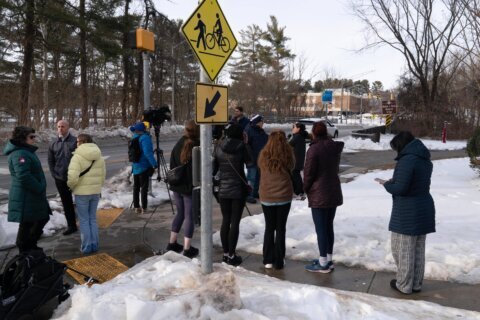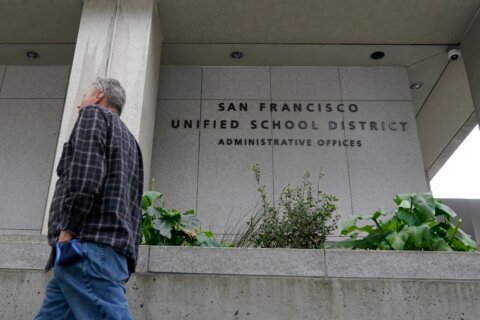Welcome to the School Zone, WTOP’s weekly feature about the latest topics and trends in education across the D.C. region.
Proposed DC law aims to expedite hiring process for school volunteers, workers
What it is: After volunteer groups reported long delays in getting cleared to work with D.C. Public School students last winter, city officials announced plans to work with a new vendor starting Nov. 1, 2021. However, months later, the delays have persisted.
Now, the D.C. Council is getting involved. Council member Christina Henderson and three other council members have introduced the Educator Background Check Streamlining Amendment Act of 2022. The proposed law would require applicants to provide employment history for either their last three employers or last seven years of work involving direct supervision of children.
Child abuse and neglect registry checks would also be required in states the applicant lived or worked in, and the proposed law adds the National Sex Offender Registry to the list of required reviews for applicants.
All D.C. Public School volunteers are required to complete a DCPS Clearance Application. Henderson said a previously-passed council bill required anyone working in certain positions to undergo a child protection registry check for every state, but that took time, because there is no national child protection registry.
Henderson told me the premise is clear: Getting cleared to work or volunteer in a D.C. public school should take about three weeks, but the current turnaround time is sometimes longer than three months.
The legislation isn’t expected to have a fiscal impact, because it’s altering processes already in place, Henderson said.
“We have lots of money available and resources available to really help stem the tide of learning loss that occurred over the last few years with the pandemic. But if we can’t hire anyone to actually do the work that is necessary, it doesn’t help us meet the success and the goals that we have outlined for ourselves,” Henderson said.
The goal is to have a public hearing to solicit feedback on the measure this fall, Henderson said. She hopes the streamlined process is in place before the summer.
DCPS said in an email that it doesn’t comment on proposed legislation, but in a news release, Henderson said it addresses concerns of “District of Columbia Public Schools, the Deputy Mayor for Education and Child and Family Services Agency.”
What it means: David Trigaux, director of the Washington Urban Debate League, told me the long delays are unique to D.C.
He said the current school year has been “the most successful recruiting year in league history,” but, “I have 31 volunteers lined up to help support them. Four have been approved.”
Despite in-house changes, like a picking a new vendor, Trigaux told me the group hasn’t seen “substantial changes in the number of background checks being processed.”
If the group’s volunteers can’t be cleared to work with D.C. Public Schools, they send those volunteers to surrounding jurisdictions instead.
“Anywhere that’s welcoming to people trying to help young people learn and move on academically, socially, emotionally, et cetera, from the pandemic,” he said.
Delays aren’t an issue for clearance to work in D.C.’s Public Charter Schools, he said.
Ryllie Danylko, a policy analyst at D.C. Action for Children, said the proposed legislation is a “thoughtful response to this long-term problem with the clearances that have really made it difficult for educators and after school employees to do their jobs.”
Regional snapshot: In Prince William County, Virginia, a spokeswoman said most background checks come back in 24 to 48 hours, unless something is uncovered, in which case it can take four weeks.
Schools in Prince George’s County, Maryland, require a fingerprint background check and Child Protective Services clearance for volunteers.
Talking points: Henderson, the council member, said the issue is top of mind because “we have staffing shortages, and it’s not for lack of resources, it’s literally for lack of we can’t get folks clear.”
Trigaux, with the Washington Urban Debate League, told me he’s optimistic about the legislation but “unless the council stays on them and watches like a hawk, I’m very suspicious that the bureaucracy will listen to the council.”
By the numbers
Some data that caught my eye this week.
ESSER spending: D.C. schools have spent about 19% of federal stimulus funds provided to them during the pandemic, according to data presented to the board of education this week. A presentation says the city has spent 18.9% of the over $113 million it was awarded.
What Scott’s Reading
- Fairfax Co. schools, Virginia education officials hit with class action suit over disability hearings [WTOP]
- Judge tosses indictment of Fairfax Co. music teacher charged with sexual battery [WTOP]
- Arrests, incidents up in 2nd half of Alexandria’s school year [WTOP]
- Montgomery Co. Public Schools unveil security measures after football game brawl [WTOP]
- Youngkin’s meeting with Va. delegation gets heated over trans policy [Washington Post]
- Proposed hearing for Prince George’s school board chair set for November [Maryland Matters]
Field Trip
Here’s a fun thought ahead of the weekend.
Sunshine state: A trip to Florida is planned, though the weekend will look largely the same. Good food, football and good company.








